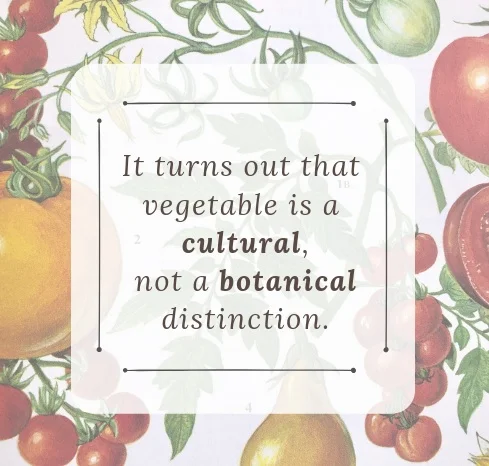What is a Vegetable?
What is a vegetable? If tomatoes are fruits and carrots are roots and celery is a stem, what exactly is a vegetable?
What's a Vegetable?
What is a vegetable? I'm serious. Smarty-pants like to point out that tomatoes are a fruit, but so are eggplant and zucchini. If carrot is a root, and celery is a stem, broccoli is a flower, and yes, tomato is a fruit, then what exactly is a vegetable?
According to Wolfgang Stuppy, the research leader in Comparative Plant and Fungal Biology at the Royal Botanic Gardens, Kew & Wakehurst Place: “the term vegetable doesn’t exist in botanical terminology.” Simple as that.
Veggies might not exist botanically, but they’re not going anywhere culturally. So we're back to square one: what’s a vegetable?
A quick flip through the dictionary is surprisingly unhelpful. The first entry in the Oxford English Dictionary is so broad as to include “any living organism that is not an animal.” Under these guidelines oak trees and hydrangeas could end up on our dinner plates. Less archaic definitions include words like “edible” and “savory.” Leading us back to well, vegetables.
As it turns out, when we’re drawing distinctions between vegetables and fruit, it's not a plant part’s botanical function that matters, but it’s culinary one. And any kid could tell you what’s what: vegetables are dinner and fruit is dessert. We knew it all along.
So why did we ask this unexpectedly complicated question? Right: tomatoes. Like many other savory vegetables, tomatoes are neither root, nor stalk, nor leaf, but—botanically speaking—fruit. And if you’re having a botanical discussion, that’s the word you should use. But if you’re in the kitchen, for the love of pizza call them vegetables.
Knowing the botanical purpose of all our vegetables can help us feel connected to our food, and grateful for it. But the next time some pseudo-smarty pants tells you that tomatoes are fruit... please let them know that strawberries are in fact a vegetable.
Aubrey Yarbrough is the Community Development Manager for Farmer Mark. Before moving to LA she ran her own organic farm and cooked on the garde manger station of the award winning Elements restaurant in Princeton, NJ. She has contributed poetry to New American Writing and prose to Edible Jersey.
Farmers Market 101: Market Tips
There are many tips and tricks to smart shopping at the farmers’ market. These tips allow you to get the biggest bang for your buck, and have the best experience possible. We’re letting you in on a few of our top tips. Keep these in mind next time your shopping at your local farmers’ market.
There are many tips and tricks to smart shopping at the farmers’ market. These tips allow you to get the biggest bang for your buck, and have the best experience possible. We’re letting you in on a few of our top tips. Keep these in mind next time your shopping at your local farmers’ market.
- Early Bird Gets the Worm: This is one of our most important tips. If the market opens at 9, get there at 9! Being one of the first customers will allow you to pick from the farmers’ full selection. You might be missing out on an incredible item that always sells out within the first hour.
- Go Big: Why not buy a whole flat of tomatoes or strawberries? If one of your favorite fruits or vegetables is in season and is looking juicy and delicious, go for it. You can always freeze or can them! Buying in bulk can often come with a nice discount. Politely ask the farmer about bulk deals available.
- Experiment: We all have our favorite farmer at a specific market, but don’t forget to explore. Challenge yourself to try at least one new vendor each week at your market. You might just find your new favorite item.
- Get Friendly: Farmers sell at the market not only to share their crops, but to get to know their customers! They love interacting and answering your questions, so don’t be shy! If your curious about their farming practices or what a certain crop is, go ahead and ask them! TIP: Remember your vendor’s name the following week and greet him with a friendly, “Morning, (insert name)!”
- Bring the Green: Most farmers operate on a cash only basis, so don’t forget to stop at an ATM before heading to the market. And keep in mind that small bill work best.






